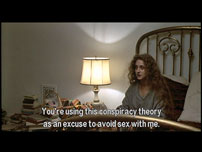| |
One of the all-time classics of self-disparaging humor is Groucho Marx's famous telegram. In reconstructing the situation in which the comedian actually used the telegram, I will try to show in a kind of "case study" of the joke, that the last thing on Groucho's mind was any concern with his own failings as a human being. But first, a brief discussion of the way in which the joke was used by Woody Allen, will help to set the stage for our analysis.
Annie Hall
Soon after the opening credits of Annie Hall (1977), Woody Allen tells the "Resignation Joke" while facing the camera (fig.2), in his role as Alvy Singer (1):
The – the other important joke for me is one that's, uh, usually attributed to Groucho Marx but I think it appears originally in Freud's Wit and its Relation to the Unconscious. And it goes like this – I'm paraphrasing: Uh... "I would never wanna belong to any club that would have someone like me for a member." That's the key joke of my adult life in terms of my relationships with women. (Allen, 1983: 4)
This "key joke" functions here as a self-diagnostic tool enabling our hero – as well as the viewer – to conceptualize a particular neurotic pattern in the life of a person who allows his feelings of unworthiness to prevent him from wanting any woman who would want him. This self-diagnostic use of the joke is further developed in a subsequent scene in which Alvy Singer interrupts his love-making with Allison Portchnik, and succeeds in engaging her in a discussion of John F. Kennedy's assassination (fig. 3-4). When Allison says: "You're using this conspiracy theory as an excuse to avoid sex with me," Alvy replies:
Oh, my God! (Then, to the camera) She's right! Why did I turn off Allison Portchnik? She was – she was beautiful. She was willing. She was real... intelligent. (Sighing) Is it the old Groucho Marx joke? That – that I – I just don't wanna belong to any club that would have someone like me for a member? (Allen, 1983: 22-23)
As already seen, Alvy attributed this joke to Sigmund Freud's Wit and its Relation to the Unconscious (1905). Actually, neither the joke itself nor any likely forerunner appears in that book. Alvy's creator was probably thinking of a joke which had appeared in Theodor Reik's Jewish Wit in the following form (2):
Every day in a coffee house, two Jews sit and play cards. One day they quarrel and Moritz furiously shouts at his friend: "What kind of a guy can you be if you sit down every evening playing cards with a fellow who sits down to play cards with a guy like you!" (Reik, 1962: 57-8)
Alvy's confusion of Reik's book with Freud's, takes nothing away from Woody Allen's brilliant use of the joke in Annie Hall.
Virtually nothing has been written about the "Resignation Joke" in the literature on Groucho Marx. This is surprising, considering the notoriety enjoyed by the joke, especially since interest in it was revived by Woody Allen in 1977. Furthermore, none of the commentators who discuss the joke at all – Sheekman (3), McCaffrey (4), Wilson (5) and Arce (6) – raise the question as to why Groucho sent the famous telegram and what purpose it was intended to fulfill. The situation in which the telegram was sent will now be reconstructed, after which the original function of the "Resignation Joke" will be described, and an attempt will be made to account for its effectiveness in fulfilling that intended function.
The Friar's Club Incident
We have two sources of information concerning the context in which Groucho Marx first used the "Resignation Joke." The earlier of these sources is the biography written by the comedian's son, Arthur Marx, who provided the following account:
[The actor, Georgie] Jessel has always been able to make Father laugh, and as a favor to him, he joined the Hollywood chapter of the Friar's Club a couple of years ago. But Father doesn't like club life, and, after a few months, he dropped out. The Friars were disappointed over losing him, and wanted to know why he was resigning. They weren't satisfied with his original explanation – that he just didn't have time to participate in the club's activities. He must have another, more valid reason, they felt.
"I do have another reason," he wrote back promptly. "I didn't want to tell you, but since you've forced the issue, I just don't want to belong to any club that would have me as a member." (A. Marx, 1954: 45)
Since this biography appeared in 1954, "a couple of years ago" would place the incident somewhere in the vicinity of 1950-1952, assuming that a year or two may have elapsed between the writing and the publication of the book.
The other account we have was written by the comedian himself in the autobiography that was published in 1959. Much unpleasantness had apparently been omitted from the earlier record, perhaps out of discretion, in order to avoid offending anyone, or because any public criticism leveled at the club had to come from Groucho himself, and not his son. And even here, Groucho took the precaution of withholding the name of the club, which appears under the same alias ("Delaney") that is jokingly applied to a number of parties portrayed in the autobiography in an unfavorable light.
Groucho begins by telling of his general aversion for clubs, and this is consistent with the earlier description in his son's book, though here the aversion is concretized to a fuller extent:
I'm not a particularly gregarious fellow. If anything, I suppose I'm a bit on the misanthropic side. I've tried being a jolly good club member, but after a month or so my mouth always aches from baring my teeth in a false smile. The pseudo-friendliness, the limp handshake and the extra firm handshake (both of which should be abolished by the Health Department), are not for me. This also goes for the hearty slap-on-the-back and the all-around, general clap-trap that you are subjected to from the All-American bores which you would instantly flee from if you weren't trapped in a clubhouse. (G. Marx, 1959: 320)
In the remainder of his account, specific grievances Groucho had against the Friar's Club (alias "Delaney Club") come to light:
Some years ago, after considerable urging, I consented to join a prominent theatrical organization. By an odd coincidence, it was called the Delaney Club. Here, I thought, within these hallowed walls of Thespis, we would sit of an evening with our Napoleon brandies and long-stemmed pipes and discuss Chaucer, Charles Lamb, Ruskin, Voltaire, Booth, the Barrymores, Duse, Shakespeare, Bernhardt and all the other legendary figures of the theatre and literature. The first night I went there, I found thirty-two fellows playing gin rummy with marked cards, five members shooting loaded dice on a suspiciously bumpy carpet and four members in separate phone booths calling women who were other members' wives.
A few nights later the club had a banquet. I don't clearly remember what the occasion was. I think it was to honor one of the members who had successfully managed to evade the police for over a year. The dining tables were long and narrow, and unless you arrived around three in the afternoon you had no control over who your dinner companion was going to be. That particular night I was sitting next to a barber who had cut me many times, both socially and with a razor. At one point he looked slowly around the room, then turned to me and said, "Groucho, we're certainly getting a lousy batch of new members!"
I chose to ignore this remark and tried talking to him about Chaucer, Ruskin and Shakespeare, but he had switched to denouncing electric razors as a death blow to the tonsorial arts, so I dried up and resumed drinking. The following morning I sent the club a wire stating, PLEASE ACCEPT MY RESIGNATION. I DON'T WANT TO BELONG TO ANY CLUB THAT WILL ACCEPT ME AS A MEMBER. (G. Marx, 1959: 320-321)
Allowances should certainly be made for a good deal of exaggeration in the account cited above. Much of it is tongue-in-cheek, and designed to entertain the reader. However, the basic picture, regarding Groucho's attitude toward the Friar's Club, can undoubtedly be taken at face value.
If the two accounts – the son's and the father's – are allowed to complete each other, we can conclude that the full sequence of events probably looked something like this:
1) Groucho allows himself to be talked into joining the Friar's Club, though he doesn't like clubs in general.
2) He quickly becomes fed up with this club in particular, because of what he sees as its low intellectual and ethical standards.
3) The last straw is the final offensive remark in a series of insults to which he is subjected by a member of the club.
4) Groucho notifies the club that he is quitting, inoffensively giving as his excuse that he just doesn't have time to participate in the club's activities.
5) Unhappy about Groucho's resignation and sensing that there may be more to it than the comedian is letting on, club members press him for the "real" reason.
6) Wanting to be done with this entanglement once and for all, Groucho pretends to disclose the real reason in the famous telegram, and is left alone from then on.
Seen in this light, it is clear that the "Resignation Joke" was invented to fulfill a tactical purpose: that of extricating Groucho from an unpleasant situation, by discouraging any further efforts on the part of club members to obtain a fuller explanation as to his reasons for resigning. But why did it work? To some degree, the apparent self-disparagement may have had a disarming effect. However, I suspect that two properties of the telegram played an even more important role in enabling it to fulfill its intended social function.
One of those properties is a defiance of logic of essentially the same type as that found in impossible figures which induce cognitive confusion by violating their own logic in so logically compelling a manner that we cannot grasp how they fit together.

“Penrose triangle” |
|

“Three-stick clevis” or
“Two-pronged trident” |
When Groucho Marx couched his "explanation" in the form of an impossible figure, he confronted the club-members with a piece of reasoning that was as impregnable to logic as a "Penrose triangle" or "three-stick clevis," and which undoubtedly mystified those who would otherwise have pressed him for the real reason for his resignation. There is simply no arguing with an impossible figure, or with a person who is capable of generating one, which in a game situation is like checkmate in the sense that it marks the end of the contest, allowing for no subsequent move.
The second property of the telegram which accounts for its effectiveness, is the fact that it was framed as a joke. In delivering his "explanation" in a form calculated to provoke laughter, Groucho made it difficult for the club-members to know how to react without looking foolish, especially since they were already implicated in the joke, as a collective butt. As one commentator put it--though not in connection with the famous telegram: "Groucho may be the most powerful clown ever. [...] because Groucho has the power to turn us nonfools into his private stock." (Despot, 1981: 671)
Furthermore, the comedian's toying with shared ridicule may have functioned as a kind of negotiation on his part: signaling his preference for severing the relationship in a playful spirit, as well as his willingness to assume (or pretend to assume) the blame for its failure, thereby sparing the club-members' feelings in exchange for a clean break. It was also a means for telling them indirectly and unmistakably that they were no match for his wit.
In any event, the joke put an end to the club-members' requests for an explanation, thereby fulfilling a very specific social function. In the process, of course, Groucho launched a hilarious "one-liner" which (he must have sensed) would be retold countless times, and would become a lasting part of his own comic profile.
Paradoxically, one of the most striking examples of a self-disparaging joke turns out to have been motivated by a wish on the jokester’s part to dissociate himself once and for all from a group of people to whom he felt superior.
- - -
|
|

Fig. 2. Woody Allen tells the “Resignation Joke” in Annie Hall.
(1) I have taken the liberty of correcting the typography of the title of Freud's book.

Fig. 3. "You're using this conspiracy theory as an excuse to avoid sex with me."

Fig. 4. “Is it the old Groucho Marx joke?”
(2) For the publication history of this joke, see Life Is Like a Glass of Tea: Studies of Classic Jewish Jokes (Aarhus: Aarhus University Press, 1992), pp. 189-190.
(3) In his introduction to The Groucho Letters (New York: Simon & Schuster, 1967), Arthur Sheekman wrote of the joke: "There, in a few satirical words, is one of the most astute and revealing observations about the self-hating, socially ambitious human animal" (p. 8).
(4) For Donald W. McCaffrey, the joke was a non sequitur, resulting from "a chain reaction of delightful pseudo-logic that almost sounded valid." The Golden Age of Sound Comedy (South Brunswick and New York: Barnes, 1973), p. 74.
(5) Christopher Wilson described the "Resignation Joke" as an example of shared ridicule, through which "the joker derides himself and his audience simultaneously [...] The message of shared disparagement being–'If you don't mind me, you've got no taste!'" Wilson was also the first to identify the joke as "a variant of the famous Jewish joke–'What sort of a shmuck do you think I am? I'm not going to sit down and play cards with the sort of shmuck who'd sit down and play cards with me." Jokes: Form, Content, Use and Function (London: Academic Press, 1978), p. 190.
(6) In his introduction to The Groucho Phile (London: W. H. Allen, 1978), Hector Arce was the first to set the telegram in its social context: Referring to the Friar's Club of Beverly Hills, Arce wrote that Groucho "had some misgivings about the quality of the members, doubts which were verified a few years later when an infamous card-cheating scandal erupted there. When he decided to drop out of the group, he wrote: 'Gentlemen: Please accept my resignation. I don't care to belong to any social organisation that will accept me as a member'" (p. xv). |
|